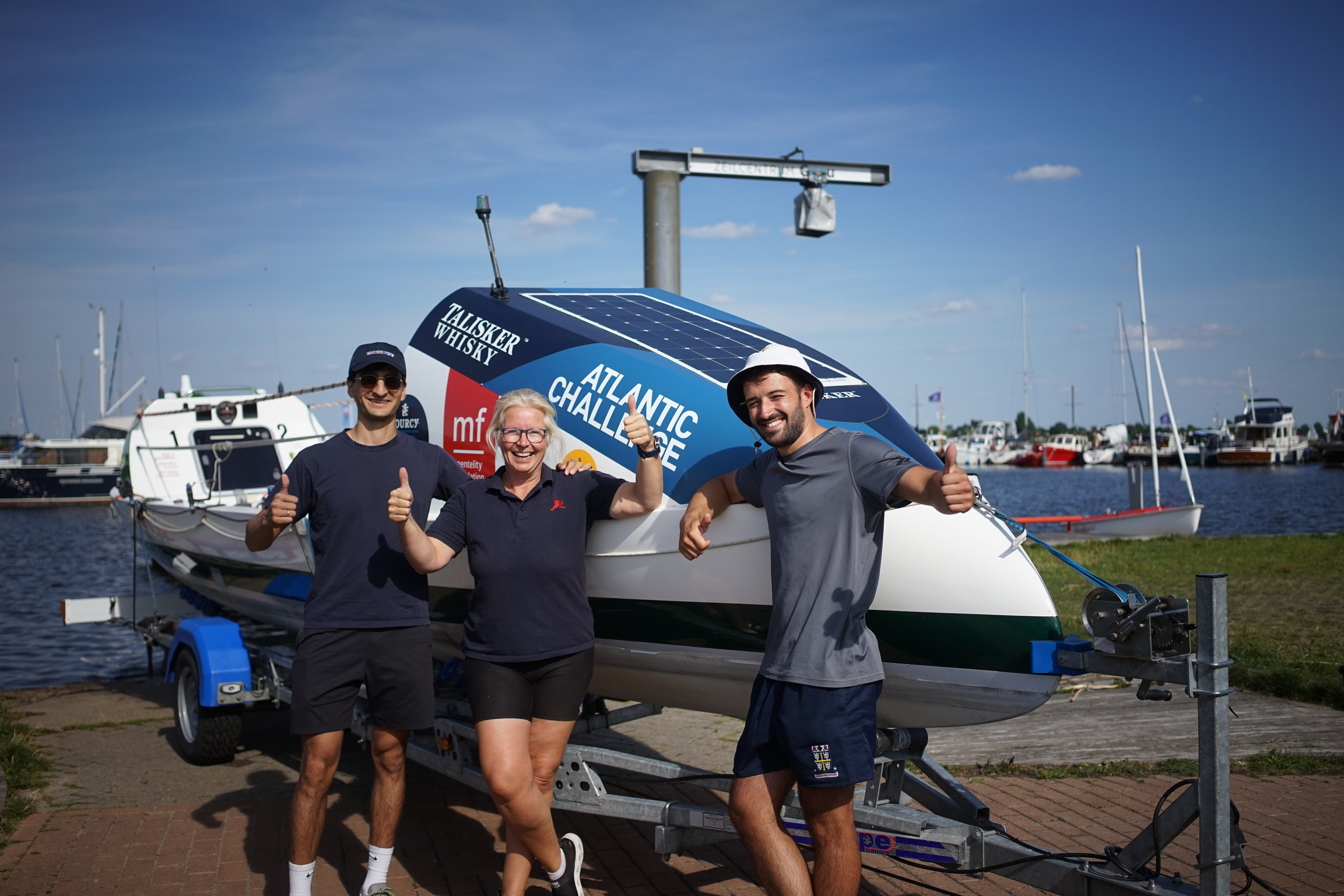Who are the people who study or work at TU Delft? We meet them in Humans of TU Delft. This time: Amir Anwar-Hameed and his team are preparing for the challenge of a lifetime.
Amir (left) and Marko (right) with the boat owner, Iris Noordzij, and their vessel for the challenge: The Queen of Hearts. (Photo: Stichting Out of the Blue Delft)
English only
Hoping to bring attention to sustainability, to raise money for charity and to inspire other students about mental resilience. These are some of the goals Amir Anwar-Hameed and team Out of the Blue are aiming for as they prepare to row across the Atlantic later this year.
“I came to TU Delft in 2015 to do a bachelor’s in Aerospace Engineering. I had a rocky start at the beginning, but eventually I got into my rhythm and I finished. After that I realised that maybe it wasn’t my passion. I found out about the master’s bridging programme into Industrial Design and now I’m doing my master’s in Strategic Product Design. I’m enjoying it a lot more because I like the freedom here to be creative. I should finish by the end of this academic year.
Later this year I’m participating in The Talisker Whisky Atlantic Challenge. It’s a rowing race of 4,800 kilometres that crosses the Atlantic from the Canary Islands all the way to Antigua in the Caribbean. This year, 40 teams are competing and it can be going solo or with a team of up to five people. That has a considerable impact on how quickly people finish the race. But the challenge within the challenge is that you’re crossing a body of water, isolated for so many days, facing 20 foot waves, and seasickness. You will go through anything you can imagine being a struggle.
We’re a team of four called Out of the Blue. The one thing that connects us all is that we’re all technical students. To be honest with you, I’ve not actually got any history in the discipline of rowing. So, since we decided to start this challenge two years ago, I’ve been getting to grips with doing rowing training. The rest of the team has different backgrounds, some have done a lot more extreme challenges related to rowing but also other sports as well. For me, this is just the beginning of it all and I think rowing is a very difficult sport in general. But I think this challenge demands a lot more than just the physical. It’s really about mentally how much you can handle. We’re talking about rowing an ocean. When you see the kind of people that have crossed the Atlantic before by rowing, they’re some of the most normal people you could imagine. They’ve all managed to do it, and that’s just setting a tone for what’s possible. That really is why I wanted to do this. I’m just an engineering student at the end of the day, but to be able to do something like this will stay with me for the rest of my life.
‘We want to be competitive, so we’re aiming for 30 days’
There’s a lot of physical training to do, but there’s also a lot of planning and administration that needs to happen and we are doing a fundraising campaign. On top of that, it’s about bonding as a team because I think on the ocean, our biggest insecurities will surface so we need to see those now rather than when we’re in the situation. You are rowing non-stop and you rotate amongst each other so you never stop the boat. For example, two of you sleep while two of you row and you switch every two hours. The world record is 29 days, and that was set by a team of four as well. We want to be competitive, given that we’re all young lads, so we’re aiming for 30 days. To get that or even close to that for us will be a phenomenal achievement.
We all have intrinsic motivations for wanting to take on such a big challenge, but as a team, we have two key goals. The first one is bringing attention to sustainability. We’re all young and we see what’s taking place now on our planet, on the ocean specifically. We’ve partnered with Reef Support to support them with an AI tool that they’re developing to help reef conservation. We hope to attach sensors to our boat which can measure things like pH levels and salinity which they can cross reference with their data. And if it proves the validity of what they’ve collected it’ll help them improve their tool. The second goal is to raise a lot of money with donations from private individuals or companies. At the end, we will distribute it to our chosen charities which align with our vision.
We also think this is a heavy undertaking with regards to mental resilience. And we think a lot of students here struggle with being in the right mindset and get overwhelmed with the workload. I know, I’ve been through that. Sometimes these kinds of struggles can lead to difficult situations. We want to be the voice that says that anything is possible – if you have a plan and if you have the desire to achieve it, don’t let anything else interfere with that. We’re doing this for ourselves, but we hope it’s going make an impact on other students and younger generations. And if we can inspire them about sustainability as well, that’s the biggest takeaway we could have.”
- The other Out of the Blue team members include Marko Rehbein (TU Delft Aerospace Engineering student), Giorsio Raboen (serious gaming student, Zwolle) and Mark Bolger (sustainability specialist, Dublin, Ireland).
Want to be featured in Humans of TU Delft? Or do you know someone with a good story to tell? Send us an e-mail at humansoftudelft@gmail.com
Heather Montague / Freelance writer



Comments are closed.